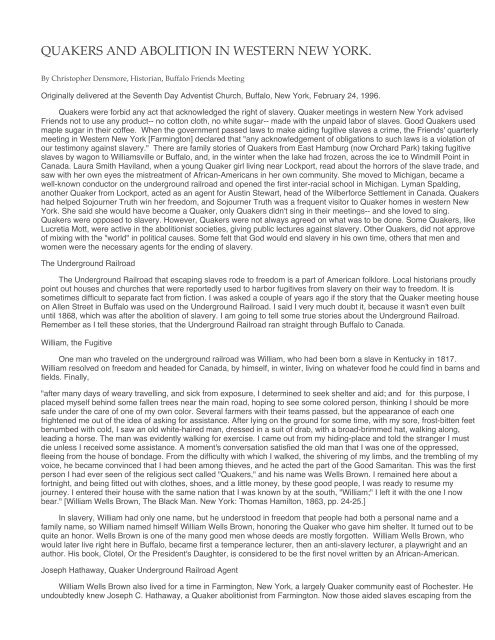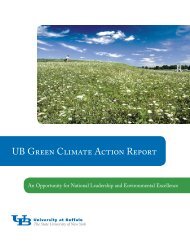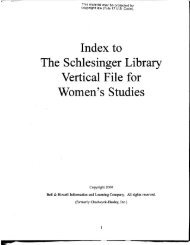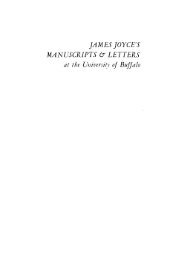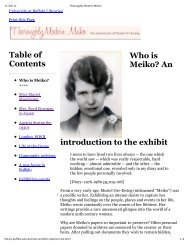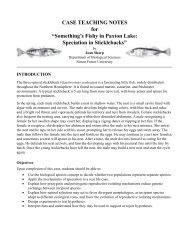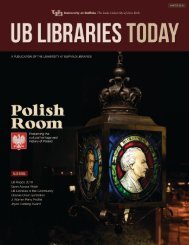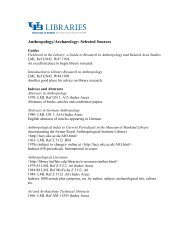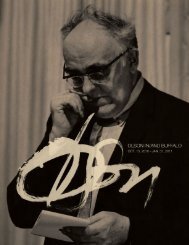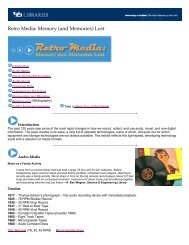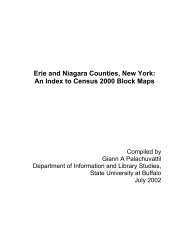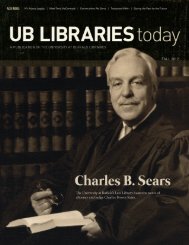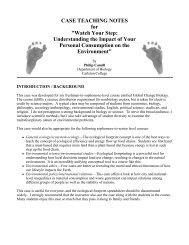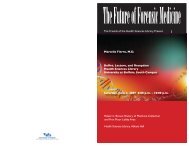Quakers and Abolition - University at Buffalo Libraries
Quakers and Abolition - University at Buffalo Libraries
Quakers and Abolition - University at Buffalo Libraries
Create successful ePaper yourself
Turn your PDF publications into a flip-book with our unique Google optimized e-Paper software.
QUAKERS AND ABOLITION IN WESTERN NEW YORK.<br />
By Christopher Densmore, Historian, <strong>Buffalo</strong> Friends Meeting<br />
Originally delivered <strong>at</strong> the Seventh Day Adventist Church, <strong>Buffalo</strong>, New York, February 24, 1996.<br />
<strong>Quakers</strong> were forbid any act th<strong>at</strong> acknowledged the right of slavery. Quaker meetings in western New York advised<br />
Friends not to use any product-- no cotton cloth, no white sugar-- made with the unpaid labor of slaves. Good <strong>Quakers</strong> used<br />
maple sugar in their coffee. When the government passed laws to make aiding fugitive slaves a crime, the Friends' quarterly<br />
meeting in Western New York [Farmington] declared th<strong>at</strong> "any acknowledgement of oblig<strong>at</strong>ions to such laws is a viol<strong>at</strong>ion of<br />
our testimony against slavery." There are family stories of <strong>Quakers</strong> from East Hamburg (now Orchard Park) taking fugitive<br />
slaves by wagon to Williamsville or <strong>Buffalo</strong>, <strong>and</strong>, in the winter when the lake had frozen, across the ice to Windmill Point in<br />
Canada. Laura Smith Havil<strong>and</strong>, when a young Quaker girl living near Lockport, read about the horrors of the slave trade, <strong>and</strong><br />
saw with her own eyes the mistre<strong>at</strong>ment of African-Americans in her own community. She moved to Michigan, became a<br />
well-known conductor on the underground railroad <strong>and</strong> opened the first inter-racial school in Michigan. Lyman Spalding,<br />
another Quaker from Lockport, acted as an agent for Austin Stewart, head of the Wilberforce Settlement in Canada. <strong>Quakers</strong><br />
had helped Sojourner Truth win her freedom, <strong>and</strong> Sojourner Truth was a frequent visitor to Quaker homes in western New<br />
York. She said she would have become a Quaker, only <strong>Quakers</strong> didn't sing in their meetings-- <strong>and</strong> she loved to sing.<br />
<strong>Quakers</strong> were opposed to slavery. However, <strong>Quakers</strong> were not always agreed on wh<strong>at</strong> was to be done. Some <strong>Quakers</strong>, like<br />
Lucretia Mott, were active in the abolitionist societies, giving public lectures against slavery. Other <strong>Quakers</strong>, did not approve<br />
of mixing with the "world" in political causes. Some felt th<strong>at</strong> God would end slavery in his own time, others th<strong>at</strong> men <strong>and</strong><br />
women were the necessary agents for the ending of slavery.<br />
The Underground Railroad<br />
The Underground Railroad th<strong>at</strong> escaping slaves rode to freedom is a part of American folklore. Local historians proudly<br />
point out houses <strong>and</strong> churches th<strong>at</strong> were reportedly used to harbor fugitives from slavery on their way to freedom. It is<br />
sometimes difficult to separ<strong>at</strong>e fact from fiction. I was asked a couple of years ago if the story th<strong>at</strong> the Quaker meeting house<br />
on Allen Street in <strong>Buffalo</strong> was used on the Underground Railroad. I said I very much doubt it, because it wasn't even built<br />
until 1868, which was after the abolition of slavery. I am going to tell some true stories about the Underground Railroad.<br />
Remember as I tell these stories, th<strong>at</strong> the Underground Railroad ran straight through <strong>Buffalo</strong> to Canada.<br />
William, the Fugitive<br />
One man who traveled on the underground railroad was William, who had been born a slave in Kentucky in 1817.<br />
William resolved on freedom <strong>and</strong> headed for Canada, by himself, in winter, living on wh<strong>at</strong>ever food he could find in barns <strong>and</strong><br />
fields. Finally,<br />
"after many days of weary travelling, <strong>and</strong> sick from exposure, I determined to seek shelter <strong>and</strong> aid; <strong>and</strong> for this purpose, I<br />
placed myself behind some fallen trees near the main road, hoping to see some colored person, thinking I should be more<br />
safe under the care of one of my own color. Several farmers with their teams passed, but the appearance of each one<br />
frightened me out of the idea of asking for assistance. After lying on the ground for some time, with my sore, frost-bitten feet<br />
benumbed with cold, I saw an old white-haired man, dressed in a suit of drab, with a broad-brimmed h<strong>at</strong>, walking along,<br />
leading a horse. The man was evidently walking for exercise. I came out from my hiding-place <strong>and</strong> told the stranger I must<br />
die unless I received some assistance. A moment's convers<strong>at</strong>ion s<strong>at</strong>isfied the old man th<strong>at</strong> I was one of the oppressed,<br />
fleeing from the house of bondage. From the difficulty with which I walked, the shivering of my limbs, <strong>and</strong> the trembling of my<br />
voice, he became convinced th<strong>at</strong> I had been among thieves, <strong>and</strong> he acted the part of the Good Samaritan. This was the first<br />
person I had ever seen of the religious sect called "<strong>Quakers</strong>," <strong>and</strong> his name was Wells Brown. I remained here about a<br />
fortnight, <strong>and</strong> being fitted out with clothes, shoes, <strong>and</strong> a little money, by these good people, I was ready to resume my<br />
journey. I entered their house with the same n<strong>at</strong>ion th<strong>at</strong> I was known by <strong>at</strong> the south, "William;" I left it with the one I now<br />
bear." [William Wells Brown, The Black Man. New York: Thomas Hamilton, 1863, pp. 24-25.]<br />
In slavery, William had only one name, but he understood in freedom th<strong>at</strong> people had both a personal name <strong>and</strong> a<br />
family name, so William named himself William Wells Brown, honoring the Quaker who gave him shelter. It turned out to be<br />
quite an honor. Wells Brown is one of the many good men whose deeds are mostly forgotten. William Wells Brown, who<br />
would l<strong>at</strong>er live right here in <strong>Buffalo</strong>, became first a temperance lecturer, then an anti-slavery lecturer, a playwright <strong>and</strong> an<br />
author. His book, Clotel, Or the President's Daughter, is considered to be the first novel written by an African-American.<br />
Joseph H<strong>at</strong>haway, Quaker Underground Railroad Agent<br />
William Wells Brown also lived for a time in Farmington, New York, a largely Quaker community east of Rochester. He<br />
undoubtedly knew Joseph C. H<strong>at</strong>haway, a Quaker abolitionist from Farmington. Now those aided slaves escaping from the
South to the North or Canada were working outside the law, <strong>and</strong> risked fines <strong>and</strong> imprisonment for their efforts, but<br />
nevertheless, H<strong>at</strong>haway was quite open about his activities.<br />
On May 5, 1842, a letter from H<strong>at</strong>haway was published in the N<strong>at</strong>ional Anti-Slavery St<strong>and</strong>ard giving the story of one recent<br />
traveler on the Underground Railroad. This individual, a nineteen year old from Virginia headed for Canada after his master<br />
wagered him against $1000 in a cock-fight. "He thought it best to use the physical <strong>and</strong> intellectual powers th<strong>at</strong> God had given<br />
him, in finding a country where an immortal being is considered of too much value to have his destiny hang upon a chicken's<br />
foot." The same letter told of another fugitive slave, living openly in Geneva, New York, <strong>and</strong> working as a barber, when his<br />
old master walked in for a shave. "He shaved him with a trembling h<strong>and</strong>; <strong>and</strong> the moment he left the shop, hurried out of the<br />
back door, <strong>and</strong> immedi<strong>at</strong>ely fled to Canada." L<strong>at</strong>er th<strong>at</strong> summer, H<strong>at</strong>haway wrote about another visitor, who, after seeing<br />
reward posters offering $600 for his capture, had not dared to seek assistance until near the end of his journey. Without any<br />
assistance, he had traveled, presumably on foot, <strong>at</strong> least the entire breadth of Pennsylvania <strong>and</strong> half of New York St<strong>at</strong>e,<br />
before boarding the Underground Railroad.<br />
Lorenzo Mabbett, Quaker Agent from Collins<br />
Lorenzo Mabbett, from Collins Center, in southern Erie County, was another conductor on the URR. In 1849, he wrote<br />
to the North Star, published by Frederick Douglass in Rochester:<br />
"A few hours since Anna G. Mabbett was seen upon one of our back roads with a horse <strong>and</strong> wagon containing besides<br />
herself a fugitive slave <strong>and</strong> his wife, all in women's <strong>at</strong>tire. The slave was about to commence school on the Reserv<strong>at</strong>ion with<br />
the Indians, when his friends learned th<strong>at</strong> the base ministers of Slaveocracy were on his track <strong>and</strong> close upon him, but [their]<br />
being put upon the route to Canada-- <strong>and</strong> not in this instance the right route-- he is safe.... The people of this place <strong>and</strong><br />
vicinity are giving such indic<strong>at</strong>ions of their love of Liberty, th<strong>at</strong> we may safely conclude the time is near, if not already <strong>at</strong> h<strong>and</strong>,<br />
when this region of Western New York will be a safe retre<strong>at</strong> for the poor panting fugitive." (North Star, Sept. 29, 1849)<br />
The Fugitive Slave Law of 1850 stiffened the penalties for assisting escaping slaves. A "Mass Meeting of the Colored<br />
Citizens of <strong>Buffalo</strong>" resolved th<strong>at</strong> "the fugitive slave bill, recently passed by Congress, not only viol<strong>at</strong>es the sacred<br />
guarantees of the Constitution, but is Anti-Republican, Anti-Christian, <strong>and</strong> unworthy of the support of enlightened freemen"<br />
<strong>and</strong> further th<strong>at</strong> "we consider the fugitive slave law no law to govern our actions, but will be resisted by us <strong>at</strong> all times, <strong>at</strong> all<br />
places <strong>and</strong> under all circumstances." (North Star, Oct. 24, 1850). The sentiment was echoed by a meeting <strong>at</strong> Collins Center:<br />
"in its principles it contravenes our highest oblig<strong>at</strong>ions of duty, one to another, or th<strong>at</strong> higher law than the Constitution th<strong>at</strong><br />
impels us to relieve suffering humanity without respect to color." (North Star, Jan. 23, 1851).<br />
Elizabeth Comstock's Story<br />
This is a story told by Elizabeth Comstock, a Quaker who lived in Michigan, <strong>and</strong> l<strong>at</strong>er moved to New York St<strong>at</strong>e. A<br />
young woman had escaped from slavery, but was being pursued by two men on horseback. With her feet bleeding, <strong>and</strong><br />
dress soiled <strong>and</strong> torn, she rushed into a barn, where a plainly dressed Quaker was busy <strong>at</strong> work. She hurriedly told th<strong>at</strong> slave<br />
c<strong>at</strong>chers were close behind. "Don't be alarmed," the Quaker said. He led her through the barn <strong>and</strong> out small door <strong>at</strong> the back,<br />
<strong>and</strong> pointed to a house. "Go to James Green <strong>at</strong> th<strong>at</strong> house <strong>and</strong> tell him th<strong>at</strong> he must take thee on immedi<strong>at</strong>ely by the<br />
Underground Railway. I will detain the pursuers here, until thou art on the way to Canada. They will never c<strong>at</strong>ch thee." So<br />
saying, the Quaker went out again by the large barn doors, <strong>and</strong> had only just time to fasten them, <strong>and</strong> nail up three or four<br />
boards across them, when the slave-c<strong>at</strong>chers rode up, <strong>and</strong> dem<strong>and</strong>ed the slave whom they had seen enter his barn. The<br />
Friend went on steadily with his work, paying very little <strong>at</strong>tention to them. They dismounted, hitched their horses to the fence,<br />
<strong>and</strong> began trying to get the door open. One of them took an axe th<strong>at</strong> was lying near, <strong>and</strong> was about to break the door open,<br />
but the Quaker told him, "Young man, thou art now in a free st<strong>at</strong>e; we have laws, <strong>and</strong> thee could go to prison for breaking<br />
into another man's premises. I assure thee I have none of thy property there, but if thou wilt not take the word of an honest<br />
man <strong>and</strong> art determined to search my barn, thou must do it legally. Thou wilt have to bring a policeman <strong>and</strong> a warrant." The<br />
two men considered wh<strong>at</strong> to do, <strong>and</strong> after a few choice words to the Quaker, agreed th<strong>at</strong> one should stay there <strong>and</strong> w<strong>at</strong>ch<br />
th<strong>at</strong> the girl did not make her escape, while the other went to get the warrant.<br />
This took some time. First, someone had unhitched their horses. Then, no one seemed willing to tell them were to find a<br />
policeman. Finally, the Quaker told them th<strong>at</strong> they had to bring a carpenter as well, since his barn just been painted <strong>and</strong> he<br />
didn't want them to make any marks when they took off boards. After two or three hours, the man returned with the<br />
policeman, warrant <strong>and</strong> a carpenter. During all this time, his companion had kept careful w<strong>at</strong>ch on the barn, too see th<strong>at</strong> the<br />
girl did not escape. All this time, the Quaker kept nailing up his boards.<br />
Finally, after some more discussion about who was going to pay if the barn was damaged, the work was completed <strong>and</strong> the<br />
barn opened. The two men rushed in, only to find the barn empty. They were quite upset. The Quaker waited for them to<br />
calm down, <strong>and</strong> because it was now nighttime, <strong>and</strong> there was no hotel for miles, he invited the two men to dinner <strong>and</strong> to stay<br />
the night. He also gave them breakfast, but th<strong>at</strong> morning the family <strong>at</strong>e <strong>at</strong> nine r<strong>at</strong>her than six as usual. As the men were<br />
leaving, the Quaker suggested th<strong>at</strong> it was useless for them to continue, as the girl was probably near Canada by now.<br />
However, if they were ever back in the area th<strong>at</strong> they were invited to seek rest <strong>and</strong> shelter bene<strong>at</strong>h his roof as his house was<br />
very open to those who needed it of either race.<br />
The girl did make it to Canada, where she earned her a comfortable living as a skilled dressmaker. (Account adapted from C.<br />
Hare, ed. Life <strong>and</strong> Letters of Elizabeth L. Comstock, 1895, pp. 66-70)<br />
Sojourner Truth <strong>and</strong> Elias Hicks
In the era before the Civil War, Christians argued about whether the Bible permitted slavery. I think for <strong>Quakers</strong> <strong>and</strong><br />
others, the question was much simpler, <strong>and</strong> all this talk about wh<strong>at</strong> Paul may or may not have meant was irrelevant. In 1863,<br />
Sojourner Truth addressed a white audience:<br />
"Children who made your skin white? Was it not God? Who made mine black? Was it not the same God? Am I to blame,<br />
therefore, because my skin is black? Does it not cast a reproach on our Maker to despise a part of his children, because he<br />
has been pleased to give them a black skin?" (N<strong>at</strong>ional Anti-Slavery St<strong>and</strong>ard, June 3, 1863)<br />
When I read this, it brought to mind a sermon delivered by the Quaker Elias Hicks forty years earlier:<br />
"We are not to consider a coloured man or woman as below us; because if we do, we give an evidence, th<strong>at</strong> self-love still<br />
domineers in our souls.... If we admit for a moment, th<strong>at</strong> a coloured man or woman is inferior to us, do we not <strong>at</strong> the same<br />
time [in]crimin<strong>at</strong>e the Almighty, <strong>and</strong> declare th<strong>at</strong> he is not the God th<strong>at</strong> we profess to believe th<strong>at</strong> he is; th<strong>at</strong> he has made a<br />
distinction in colours; <strong>and</strong> th<strong>at</strong> these blacks are not his cre<strong>at</strong>ures to the same extent th<strong>at</strong> whites are?" (Elias Hicks, A Series<br />
of Extemporaneous Discourses..., 1825, p. 237)<br />
Sojourner Truth <strong>and</strong> Elias Hicks were not arguing theology. They simply saw no reason why such an incidental m<strong>at</strong>ter<br />
as race should divide people, particularly those who professed to follow the teachings of Jesus. All men <strong>and</strong> women were<br />
brothers <strong>and</strong> sisters.<br />
Farmington Quarterly Meeting, 1836<br />
Let me close by reading a few lines from an 1836 "Address" from Farmington Quarterly Meeting to <strong>Quakers</strong> in Western<br />
New York.<br />
"A mere theoretical belief in Christ is of no avail. Living faith calls for the exercise of active virtues. The practical christian...<br />
considers all mankind... as his brethren, <strong>and</strong> himself under solemn oblig<strong>at</strong>ions to use all in his power, to amelior<strong>at</strong>e the<br />
condition of his fellow men, of every color <strong>and</strong> every condition in life.... When a plain <strong>and</strong> positive duty is enjoined, no<br />
excuses... can shield us from responsibility."


